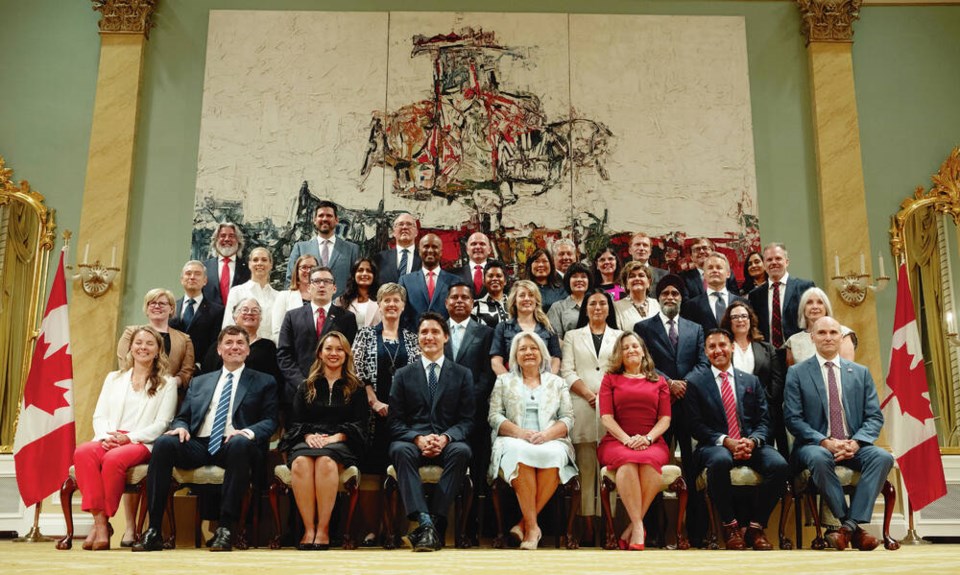When we think of inflation, we think of soaring food costs, sky-high rental fees, unaffordable gas prices. But there’s another kind as well.
When Justin Trudeau unveiled his new cabinet last month, he set a record for the most ministers ever — 39 in all. That’s 25 per cent of his entire caucus, and they don’t come cheap. A federal cabinet minister takes home around $275,000 a year plus a generous pension when the time comes.
Moreover, this list doesn’t include a further 34 parliamentary secretaries also living off the public purse. Add them in, and nearly half the Liberal caucus have been given an office. Apart from the utter waste of money, there are several reasons for deploring Trudeau’s bulging cabinet.
First off, it’s far out of proportion to the need. Prime minister Mackenzie King took Canada to war with a cabinet of just 16.
No one would accuse either Pierre Trudeau or Brian Mulroney of parsimony, yet Trudeau managed with a cabinet of 29, and Mulroney began his second term in office with just 22 ministers.
Jean Chrétien started out with 23 ministers, and Stephen Harper with 26. So why does Justin Trudeau need 39?
One significant downside of this bloat is that it can only be accomplished by subdividing ministries, and creating frivolous cabinet posts with no other purpose than a step-up for needy back-benchers. Thus we have both a minister of health, and a minister of mental health and addictions. (B.C. Premier David Eby also affects this form of needless duplication.)
Then there’s a minister of international development plus a minister of export promotion.
Likewise we have a minister of Crown-indigenous relations, and a minister of indigenous services. There’s even a new housing minister, though Trudeau recently had this to say: “I’ll be blunt as well — housing isn’t a primary federal responsibility”.
There is another consideration to weigh.
In those smaller cabinets employed by Pierre Trudeau, Mulroney, Chrétien and Harper, numerous ministers had the kind of presence that adds weight to a government front bench.
Among Trudeau’s colleagues, Jeanne Sauvé went on to be Governor General, John Turner later became prime minister, and so did Jean Chrétien.
Of Mulroney’s ministers, Joe Clark had been prime minister, Lucien Bouchard was elected premier of Quebec, and John Crosbie was appointed Lieutentant Governor of Newfoundland.
Jean Chrétien boasted a stellar cabinet, with names like Lloyd Axworthy, Paul Martin, and Allan Rock.
Several of Stephen Harper’s colleagues likewise became household names. Rona Ambrose was elected Conservative Party leader after Harper. So was Pierre Poilievre. As finance minister, Jim Flaherty balanced the budget — a bridge too far for his successors.
Yet a glance at Justin Trudeau’s cabinet reveals a plenitude of names few have ever heard of, nor are likely to.
In part that may be because public office no longer seems to attract the quality of aspirants we once took for granted.
But it’s also because, in a bloated front bench, responsibilities are too dispersed for anyone to shine. There just isn’t enough work to go around.
Unavoidably, that impacts overall performance. With too many mouths clamouring for attention, it’s often not clear whose court the ball is in.
Bureaucratic wrangling and disputes over territory take the place of far-sighted decision-making, a quality all too lacking in recent federal governments.
With this exercise in favour-granting, the prime minister has shown a disregard for the essentials of cabinet government. A seat on the front bench is meant to be a reward for talent, not an exercise in window dressing.
With so many challenges demanding Ottawa’s attention — failing healthcare, unaffordable housing, ruinously high interest rates, random crime in city centres — it is beyond distressing that the prime minister is more concerned with pre-election posturing.
>>> To comment on this article, write a letter to the editor: [email protected]



